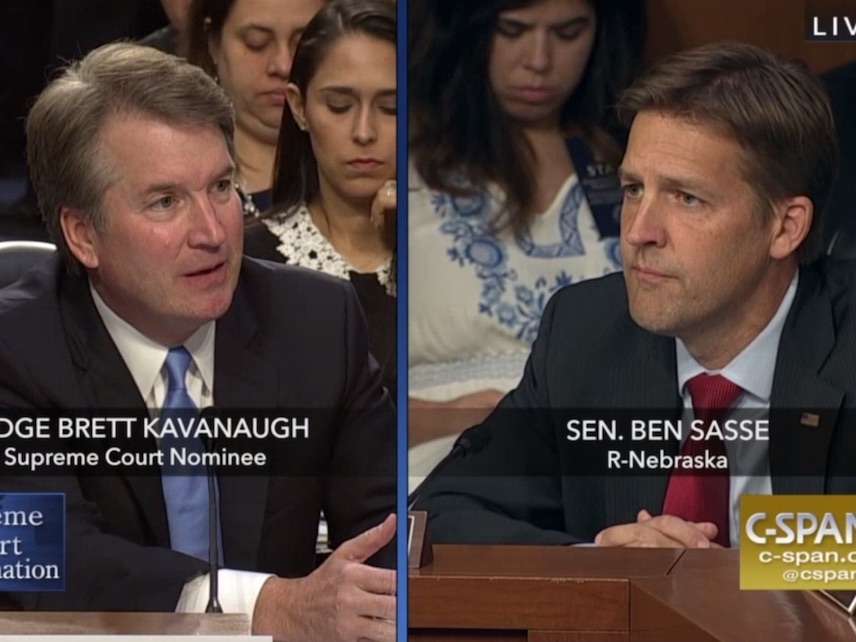Brett Kavanaugh and Ben Sasse Talk About Overturning Supreme Court Precedent
A revealing exchange between the SCOTUS nominee and the Republican senator.

With one simple question, Sen. Ben Sasse (R-Neb.) succeeded yesterday in doing what Senate Judiciary Committee Democrats spent two days trying and failing to do: Namely, Sasse got Supreme Court nominee Brett Kavanaugh to speak favorably about the idea of overturning a Supreme Court precedent.
The Democrats, of course, had been pressing Kavanaugh about Roe v. Wade, the 1973 precedent that recognized a woman's constitutional right to have an abortion. Kavanaugh had a stock answer at the ready. Roe is a precedent of the Supreme Court, Kavanaugh repeated again and again, in various formulations, and is entitled to respect under principles of stare decisis. The notion of overturning that precedent, or any other, was not mentioned.
Sasse approached the question of overturning precedent from a different angle. "It isn't the case that every decision the Supreme Court has ever made is right and is now a part of the permanent rulebook. You sometimes have to throw them out," he said. "So, sixth-grade level, help us understand how from 1896 to 1954…in those 58 years the Court was wrong for that whole time." Sasse was referring to Plessy v. Ferguson, the 1896 ruling that enshrined the doctrine of "separate but equal," and to Brown v. Board of Education, the 1954 decision that overruled Plessy. "The way we think about precedent," Sasse observed, "we might have our sixth graders thinking we should always take every received decision as right. So how do you reconcile the two?"
"One of the genius moves of Thurgood Marshall," Kavanaugh replied, "among many genius moves, was to start litigating case by case." Marshall was the NAACP lawyer (and future Supreme Court justice) who spearheaded the litigation and ultimately argued and won Brown before the Supreme Court. "He knew Plessy was wrong the day it was decided," Kavanaugh continued. "But he also knew as a matter of litigation strategy the way to bring about this change was to try to create a body of law that undermined the foundations of Plessy. And he started litigating cases and showing, case by case, that separate was not really equal." That, Kavanaugh concluded, was how Marshall "was able to show that the precedent, even with principles of stare decisis in place, should be overturned."
This exchange illuminates a crucial point that tends to get ignored amidst the spectacle of a confirmation fight. That point is this: Nobody truly believes that Supreme Court precedent is 100 percent sacrosanct. Nobody on the left thinks this, and nobody on the right thinks this. Indeed, everybody involved in the legal debates over the meaning and application of the Constitution can probably name at least one SCOTUS precedent that they would like to see destroyed. Many conservatives would of course like to see Roe reversed. Many progressives would like to see Citizens United go down. For my part, I'd put The Slaughter-House Cases on the chopping block.
To be sure, stare decisis is a venerable doctrine in American law. But as Sen. Sasse's questioning reminds us, it is not the only venerable doctrine.


Show Comments (69)